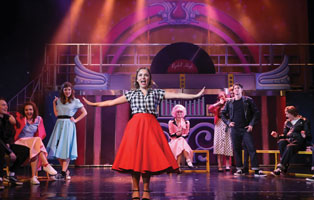
Consider the experience of being a boarder in the twenty-first century – tentatively exploring ‘who I am’ through the glaring lens of relentless social media feeds, with the emotional burdens of ‘always on’ connectivity.
Drama may hold the key. An indication of this direction of travel can be seen in a recent World Economic Forum report The Future of Jobs 2020 (https://www.weforum.org/reports/the-future-of-jobs-report-2020). The report notes that employers are prioritising creativity and emotional intelligence. These more ‘human’ skills are seen to balance the trend towards artificial intelligence and machine learning.
As a result of the cultural and employment challenges facing our young learners today we may need to re-evaluate the kinds of knowledge and capacities that will empower them to thrive in an unknowable future. And here we come to an old idea. Aristotle’s concept of ‘phronesis’ or ‘practical wisdom’ is an intelligence gathered from practical action and creativity that ultimately informs a person how to ‘be’ in the world. Concerned with not only the ‘head’ (what to know) but crucially also with the ‘hand’ (how to act) as well as the ‘heart’ (how to feel), Aristotle emphasised the significance of not only ‘what to know’ but also ‘how to know’.
So how do we provide opportunities to facilitate practical wisdom and emotional intelligence in our schools? I believe that teaching and learning drama is a compelling answer. By embodying characters from other times and places, drama uses the universality of human experience to uncover shared emotional and personal connections. Drama can develop perspectives between ‘self’ and ‘other’ through its inherently social and collaborative methods of working, encouraging empathic thinking and behaviour. During the iterative process of creating a piece of drama, creativity and imagination help to provide a transformative space of possibility that supports the development of practical wisdom, kindness, healing and understanding – qualities that transfer readily to the wider life of the pupil.
With its consideration of multiple perspectives, drama explicitly teaches what many consider to be one of the most urgent capacities in education: empathy. The word ‘empathy’ originates from the German philosophical term Einfühlung (‘feeling into’) and the Greek rootpathos, which translates as emotion, suffering and pity. It is now understood to mean the ability to move beyond ourselves in order to understand the feelings and experiences of others.
A facility to empathise enables the skills of collaboration, complex problem-solving and cognitive flexibility needed to negotiate life in a busy boarding school, as well as developing other critical emotional intelligences necessary for adulthood in the twenty-first century. The late educationalist Ken Robinson made an urgent call for empathy as the next educational disruptor – he believed that many of the problems children face are rooted in failures of empathy. The ability to ‘feel into’ can facilitate the development of a child or young person experiencing challenges into an agile, resourceful and resilient adult.
As a drama teacher, this concern with practical wisdom and empathy has led me to pursue my own research focusing on dramaturgical strategies that enable pupils to develop and deepen their foundational human capacity to imagine the world of another; a competency that may help them to adapt and thrive together in the modern world of an unknowable future. Children and young people face an unprecedented scale of challenge and by refining our approach to not only ‘what’ kind of knowledge is useful but more importantly, ‘how’ to know it, I believe we are giving them every chance to succeed in whatever landscape they find themselves in after their time with us. They deserve nothing less.
Subscribe / latest articles and news from our schools